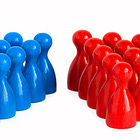Research Hit: Low Self-Awareness Increases Emotional and Moral Brain Responses to Political Topics
New research shows that low self-awareness predicts higher brain and emotional reactions to moralised (political) issues.
Hasn’t there already been a lot of research on politically polarised brains?
Yes, there has been plenty of research into decision making and politically polarised brains (some of which I have reported on). But this make some interesting connections between self-awareness, morality and brain activation patterns.
Tell me more…
Well, first let’s state the obvious, in certain political situations such as protests, those with different political ideologies will either support, or reject and condemn protests including those that become violent.
We all know that. Nothing new there, but what is driving this and how does the brain respond?
We already know, for example, that certain morals are ranked and rated as more, or less, important by the political poles (left and right in a US context here).
And what is happening in the brain?
Well, first something unsurprising and then something more surprising.
First 80 adults recruited form the Chicago area completed a survey on their attitudes towards some politically polarised topics such as gun control and climate change and rated how much they supported or opposed these. 45 of these with clear views on these topics then underwent brain scanning while viewing pictures of protests for or against these causes and had to choose which group they supported.
The speed of the decision about groups or protestors was influenced by how they felt morally about these topics. This is interesting because it seems many view these as morally “correct”. Morals are deeply embedded in us human beings as deep sacred values (but obviously differ between people and groups).
Brain activity was in regions associated with emotional importance, conflict monitoring, and cognitive control, specifically: anterior insula, anterior cingulate cortex, and lateral prefrontal cortex. This matches other research.
So moral conviction accelerates judgements and the intensity of these judgements on political hot topics and indeed this matches brain activation patterns. Something we can kind of intuit already but nice to have this backed up by brain science.
But something else was more interesting.
What was that?
The interesting part was measuring metacognitive sensitivity
What on earth do you mean with that?
Metacognition is the ability to think about thinking - so here it is how aware you are of your own thinking processes.
Participants had also done an activity where they had to judge which of two images had more dots and then rank their confidence in their decisions. And the fascinating discovery was that those who had the lowest ability in distinguishing between correct and incorrect judgements (and mismatched confidence levels) showed the strongest brain responses and the highest moral conviction.
Oh isn’t that worrying?
Yes, it is it shows that those who are most convinced and most emotionally fired up by political issues which they view as moral, have the lowest levels of self awareness.
That can lead to all sorts of problems and inability to review standpoints.
But it would match many of our experiences of that highly emotional political warrior.
So we need to build self-awareness?
Easier said than done in those who are not receptive!
Of note, that other research has shown that uncertainty avoidance is also key to political polarised issues (for those on the left and right).
The researchers do note that they would like to do further research into this and, for example, if training metacognitive ability could change responses - I would welcome that and presume it would.
But we’ll have to wait for that.
Reference
Cao, Q., Cohen, M.S., Bakkour, A. et al.
Moral conviction interacts with metacognitive ability in modulating neural activity during sociopolitical decision-making.
Cogn Affect Behav Neurosci 25, 291–310 (2025).
https://doi.org/10.3758/s13415-024-01243-3






